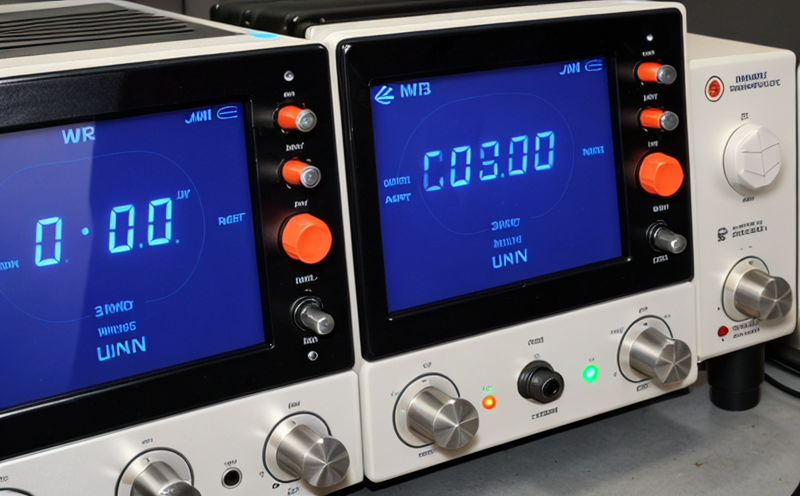ETSI EN 303 204 Smart Meter Wireless Communication RF Compliance
The European Telecommunications Standards Institute (ETSI) standard EN 303 204 outlines the requirements for wireless communication in smart meters. This test ensures that devices operating within the designated frequency bands comply with electromagnetic compatibility (EMC), interference, and safety standards to ensure seamless integration into smart grid infrastructure.
The primary focus of this standard is on ensuring interoperability, reliability, and security of communications between smart meters and the utility network. Compliance with ETSI EN 303 204 is essential for manufacturers looking to meet regulatory requirements in Europe. This service covers all aspects of testing that ensure devices meet these stringent standards.
The process involves rigorous testing of wireless communication modules within a controlled environment. The test setup includes calibrated antennas, spectrum analyzers, and other specialized equipment necessary to simulate real-world conditions accurately. Our experts perform tests across various frequency bands specified by the standard, including 433 MHz, 868 MHz, and 915 MHz.
Compliance testing under ETSI EN 303 204 ensures that smart meters operate without causing harmful interference to other devices in the vicinity. This is critical for maintaining a stable and secure communication network within homes and public spaces. The test also evaluates the robustness of the wireless signals against environmental factors such as noise, distance, and obstructions.
Our testing methodology follows international standards meticulously. For instance, we use ISO 17025-accredited laboratories to ensure precision and reliability in our results. We employ state-of-the-art equipment like vector network analyzers (VNAs) and spectrum analyzers to perform comprehensive measurements.
The testing process involves several stages, each designed to validate a specific aspect of the smart meter’s wireless communication capabilities:
- Frequency stability checks
- Interference resistance tests
- Sensitivity and range evaluations
- Power consumption assessments
- Security protocol verifications
Each stage is crucial in ensuring that the smart meter can operate efficiently and securely within a complex communication network. By adhering to these rigorous standards, manufacturers can ensure their devices meet regulatory requirements and provide reliable service to consumers.
The importance of ETSI EN 303 204 cannot be overstated. In an increasingly interconnected world, the reliability of wireless communications is paramount. Smart meters play a vital role in managing energy consumption efficiently, and ensuring compliance with this standard helps maintain the integrity of the entire smart grid ecosystem.
Our team of experts ensures that every aspect of the testing process adheres to the latest standards and best practices. From initial setup to final analysis, we provide comprehensive support to help you achieve successful compliance testing.
Applied Standards
The primary standard applied in this service is ETSI EN 303 204:2018. This document provides detailed specifications for the electromagnetic compatibility (EMC) and interference requirements of wireless communication devices used in smart meters. Compliance with ETSI EN 303 204 ensures that devices operate safely, reliably, and securely within the designated frequency bands.
Additionally, this service aligns with other relevant international standards such as ISO/IEC 17025, which accredits laboratories for their technical competence. Our testing facilities meet these rigorous requirements, ensuring that our results are accurate and reliable.
The standard covers various aspects of wireless communication, including:
- Frequency Band Compliance: Ensuring compatibility with the specified frequency bands (433 MHz, 868 MHz, 915 MHz).
- Interference Resistance: Evaluating a device's ability to function effectively in the presence of other devices.
- Sensitivity and Range: Assessing how well a smart meter can communicate over long distances.
- Security Protocols: Verifying that communication is protected against unauthorized access or interference.
By adhering to these standards, manufacturers can ensure their products are robust and reliable, providing consumers with peace of mind regarding the functionality and security of smart meters.
Why Choose This Test
- Regulatory Compliance: Ensures adherence to ETSI EN 303 204, a critical requirement for marketing devices in Europe.
- Enhanced Reliability: Verifies that smart meters can operate reliably even in challenging environmental conditions.
- Improved Security: Evaluates the security protocols used to protect against unauthorized access and interference.
- Interoperability: Ensures seamless communication between different devices within a smart grid infrastructure.
- Risk Mitigation: Helps identify potential issues early in the product development cycle, reducing costly rework or recalls.
- Market Access: Facilitates easier entry into European markets, where compliance with this standard is mandatory.
Selecting our service guarantees that your smart meter devices meet all necessary requirements for market entry and operation within Europe. Our comprehensive testing ensures not only regulatory compliance but also the highest standards of reliability, security, and performance.
Use Cases and Application Examples
The ETSI EN 303 204 test is particularly relevant for manufacturers developing wireless communication devices used in smart meters. These devices must comply with strict standards to ensure they can operate effectively within a complex, interconnected network.
Application Example 1: A utility company implementing a new smart meter system that requires interoperability between various brands of meters and the central control systems. Ensuring compliance with ETSI EN 303 204 would guarantee seamless communication and data exchange.
Application Example 2: An IoT device manufacturer aiming to expand its product line into European markets. By obtaining this certification, they can enter the market without additional delays or costs associated with non-compliance.
The use of smart meters in residential settings also benefits from this compliance. For instance, a homeowner using a smart meter can monitor energy consumption more accurately and receive real-time feedback on their usage patterns. This information helps users make informed decisions about their energy consumption, leading to potential cost savings and environmental benefits.
Furthermore, the reliability of communication between devices in public spaces such as commercial buildings or industrial facilities is crucial. In these environments, ensuring that smart meters can operate without interference is vital for maintaining efficient operations and reducing downtime.
The standard’s focus on security protocols also plays a critical role in protecting sensitive data transmitted via wireless networks. This feature is particularly important when dealing with large-scale deployments where multiple devices communicate simultaneously.





